#phantasmat
Text
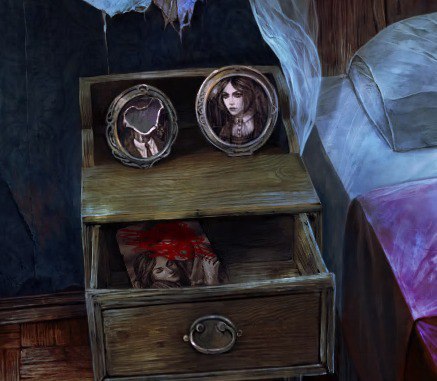
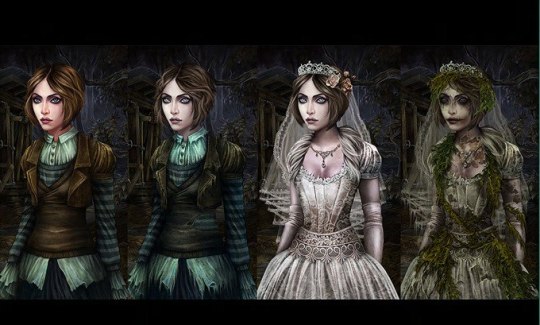
Phantasmat
-------------------
I played this game a year ago. And just recently, the 2nd part of the series passed. I will say that I got strong emotions from the passage of the second part of Phantasmat. She became my favorite for the rest of my days. Soon there will be screenshots and ediths I played this game a year ago. And just recently, the 2nd part of the series passed. I will say that I got strong emotions from the passage of the second part of Phantasmat. She became my favorite for the rest of my days. Soon there will be screenshots and ediths🔥
-------------------
P.s: I use a translator. If half of the words are not clear, sorry👁️👅👁️
12 notes
·
View notes
Text
roman being uncomfortable with firing gerri when his father told him to do it vs doing it of his own volition after his father has died > freudian melancholy wins again.
#identifications which are formed from unfinished grief are the modes in which#the lost object is incorporated and phantasmatically preserved in and as the ego#sorry judith butler you're writing about succession now </3#you have to believe i'm my father or i'm firing you so i can be my father haha#i shall go vomit now#succession
9 notes
·
View notes
Text
There's a time and a place for privilege discourse and "lane" discourse. But if you argue endlessly over whether a cis gay man is misogynistic or transphobic for talking about having a "pussy" in a phantasmatic sense, whether a butch lesbian's self identification is "correct" if they enjoy being perceived as a man in certain contexts, whether a trans woman is guilty of self-misgendering by calling herself a faggot, whether a straight guy in nail polish is "co-opting queer culture," or otherwise whether people adhere to their gender lanes... It feels a bit, how do you say, un-queer.
1K notes
·
View notes
Text
Gender researcher Judith Butler argues that the anti-gender movement is bringing us closer to authoritarianism

The famous gender researcher Judith Butler is out with a new book called Who's Afraid of Gender. In an article in the Los Angeles Times she explain why she thinks contemporary transphobia brings us closer to authoritarianism.
She writes:
The fear of “gender” allows existing powers — states, churches, political movements — to frighten people to come back into their ranks, to accept censorship and to externalize their fear and hatred onto vulnerable communities.
Those powers not only appeal to existing fears that many working people have about the future of their work or the sanctity of their family life but also incite those fears, insisting, as it were, that people conveniently identify gender as the true cause of their feelings of anxiety and trepidation about the world.
The project of restoring the world to a phantasmatic time before gender promises a return to a patriarchal dream order that only a strong state can restore. The shoring up of state powers, including the courts, implicates the anti-gender movement in a broader authoritarian, even fascist project.
We see the rolling back of progressive legislation and the targeting of sexual and gender minorities as dangers to society, as exemplifying the most destructive force in the world, in order to strip them of their fundamental rights, protections and freedoms.
Read the whole article here.
See also:
Feminist philosopher Judith Butler is crystal clear in her condemnation of transphobic feminists
Renowned Feminist Philosopher Judith Butler Tears Transphobic Feminism Apart
Feminist philosopher Judith Butler goes up against anti-trans and anti-gender feminists and conservatives
80 notes
·
View notes
Text
As soon as the discourse of the campus becomes a libidinally fraught fantasy about children to whom something might happen, we find ourselves on the theoretical terrain mapped by the Lacanian theorist Lee Edelman two decades ago in No Future: Queer Theory and the Death Drive (2004). As I have previously argued in this magazine, in the discourse of the campus the student turns out to be a type of the Child—the organizing trope of the heterosexist ideology Edelman calls “reproductive futurism.” Reproductive futurism is, among other things, an ideology of security: the sacrosanct Child, “the telos of social order, …the one for whom that order is held in perpetual trust,” must be protected at any cost; the naturalness of heterosexuality and the gender binary must never be questioned. Katehi’s narration of the primal fantasy of the campus exhibits reproductive futurism at its most histrionic. In the imagined body of the “very young girl,” collective anxieties about the Child and about social reproduction—always raced; note, again, the specter of miscegenation hanging over the narrative—are given pornographic form.
And then thought stops abruptly: whenever there is a risk that something might happen to the Child, the time for thinking is over. It is time for action, reaction. Time to call the police. That actual UC Davis students, engaged in an act of passive resistance, were hurt as a result of this frenzy to protect the “very young girls” of UC Davis belies the phantasmatic status of the latter.
Viewed through the lens of Edelman’s argument in No Future, the fantasy of the campus appears as an allegory of the nation-state. The future of the nation itself is taken to be at stake in what happens “on campus.” Both nation and campus are supposed to be securely bounded, to keep safe the Child; in both cases, this safety proves impossible to guarantee, and this ineluctable exposure—to violence, to liability, to non-affiliates—spikes the panic. When there is “campus unrest,” panic flares because the campus is supposed to be where unrest does not happen, where the Child is safe from reality. Panic nudges both campus and nation toward ever more extreme, ever more militarized practices, aesthetics finally subordinated to terror. Borders, checkpoints. An especially shrill Columbia Business School professor has taken to demanding, on any media platform he can access, that students who chant “Free Palestine!” should be expelled and banned from the Columbia campus.
The Child must be defended. So, enemies must be banished. So, a camera must be installed. So, a wall must be built. But let it be covered in ivy!
—Samuel P. Catlin, "The Campus Does Not Exist: How campus war is made," Parapraxis Magazine. Emphasis mine.
23 notes
·
View notes
Text
The combination of neoliberalism’s deprecation of the political and the social and a desublimated, wounded white masculinity together generate a disinhibited freedom, one symptomizing ethical destitution even as it often dresses in religious righteousness or conservative melancholy for a phantasmatic past. This freedom is paradoxically expressed as nihilism and against nihilism, attacking and destroying while faulting its objects of derision for the ruin of traditional values and order. It is freedom unbridled and uncultured, freedom to put a stick in the eye of accepted norms, freedom from care of the morrow. This is the freedom remaindered by nihilism, in the making for centuries and intensified by neoliberalism itself. It is the freedom of “I will because I can, because I believe in nothing and I am nothing other than my will to power.” This is humanity without a project other than revenge, without restraint by conscience, faith, or value and without belief in either human or divine purposes.
Wendy Brown, In the Ruins of Neoliberalism
23 notes
·
View notes
Text
Here is something like a confession which is meant merely to thematize the impossibility of confession: As a young person, I suffered for a long time, and I suspect many people have, from being told, explicitly or implicitly, that what I "am" is a copy, an imitation, a derivative example, a shadow of the real. Compulsory heterosexuality sets itself up as the original, the true, the authentic; the norm that determines the real implies that "being" lesbian is always a kind of miming, a vain effort to participate in the phantasmatic plenitude of naturalized heterosexuality which will always and only fail. And yet, I remember quite distinctly when I first read in Esther Newton's Mother Camp: Female Impersonators in America that drag is not an imitation or a copy of some prior or true gender; according to Newton, drag enacts the very structure of impersonation by which any gender is assumed. [...] Drag constitutes the mundane way in which genders are appropriated, theatricalized, worn, and done; it implies that all gendering is a kind of impersonation and approximation. If this is true, it seems, there is no original or primary gender that drag imitates, but gender is a kind of imitation for which there is no original; in fact, it is a kind of imitation that produces the very notion of the original as an effect and consequence of the imitation itself.
-Judith Butler, "Imitation and Gender Insubordination"
4 notes
·
View notes
Text
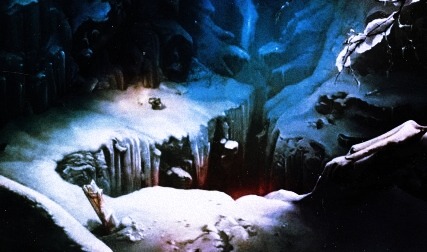
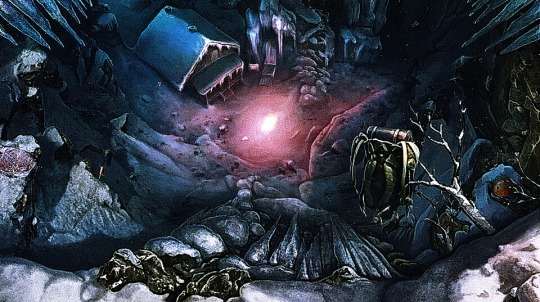

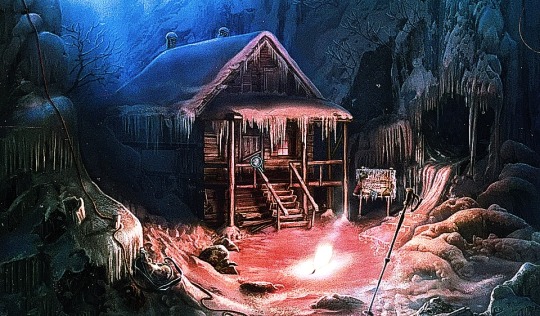
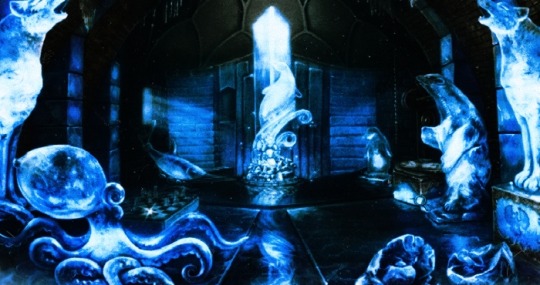
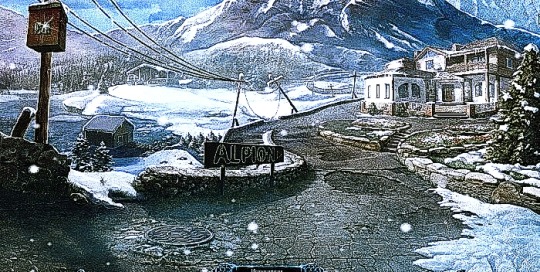
Phantasmat 2: Crucible Peak
_____________________________
As I wrote in my last post about Phantasmat, my favorite part of the game is "Phantasmat 2: Crucible Peak"
It proved to be not only a game that can cause goosebumps and shock from cutscenes, which will be worked out in detail with its atmosphere, but also with the plot of the characters.
Oh, what a wonderful animation the characters have (especially Gretta's movements)
_____________________________
P.s: I use a translator. If half of the words are not clear, sorry👁️👅👁️
#phantasmat#phantasmat 2: crucible peak#crucible peak#pc games#video games#hidden object#hidden object game
9 notes
·
View notes
Text
Introduction Post
Hello and welcome! This is my main blog that I've now repurposed into a Hidden Object Game-fanbased space. My pronouns are they/them and you may call me "Rainbow"!
My favorite HOPA games:
Brink of Consciousness: Dorian Gray Syndrome
Weird Park: Broken Tune + Scary Tales
Whispered Secrets: Morbid Obsession
Mystery Legends: The Phantom of the Opera
Nightmares From the Deep: The Cursed Heart
Bonfire Stories: The Faceless Gravedigger + Heartless
Other games/series I've played:
Engimatis and Ghost Files series + lots of Artifex Mundi games
Mystery Case Files
Dark Parables (Not too invested in them, though, sorry!)
True Fear: Forsaken Souls 1 & 2
Otherworld: Spring of Shadows (Currently playing the other games)
Seeker's Notes: Hidden Objects
Phantasmat (Currently playing the other games)
The Invisible Man
-And many more!
On this blog, I plan to share & create content, headcanons, theories, fanart, reviews, fanfiction, etc. based upon Hidden Object games. You can send me an ask about the games I post, for mine/your own recommendations, and/or anything! Feel free to DM me as well. I'd love to meet other people that play these games!
More information below the cut:
My sideblogs are as listed:
@tnbc-thoughtsandheadcanons (Nightmare Before Christmas fanblog)
@rainbows-fanfics (Fanfiction/writing blog)
@rainbowfox-art (Art/reference blog)
@piecesofchess (Pirate101 fanblog)
@rainbowthefox (Personal blog, where I first posted about Hidden Object games)
@haveyouplayedthispinball (Poll blog for pinball machines)
--If you see me following you, it may be for any of these fanbases. I cannot change my Main blog, so please bear with me. <3
Additional Info:
-I try to tag all potentially upsetting/triggering material. If I missed anything, feel free to let me know in a DM! I will tag/delete posts properly.
-Please do not repost, trace, or steal my art without permission.
-While I am 21+, please don’t send me NSFW-related anonymous asks. I’d rather talk about that with people I know personally and not anonymously.
-My icon is Curioso from Whispered Secrets: Morbid Obsession (drawn by @/psychicaves), and my header is Oscar from Brink of Consciousness: Dorian Gray Syndrome! (Drawn by @/mosswyrmz)
-Please do not send any anonymous hate, and keep an open mind that I have personal opinions on the games I play.
15 notes
·
View notes
Text

How the anti-gender movement is bringing us closer to authoritarianism
Judith Butler / March 16, 2024
In the United States, gender has been considered a relatively ordinary term. We are asked to check a box on a form, and most of us do so without giving it too much thought. But some of us don’t like checking the box and think there should be either many more boxes or perhaps none at all. The myriad, continuing debates about gender show that no one approach to defining or understanding it reigns. It’s no longer a mundane box to be checked on official forms.
The anti-gender ideology movement, however, treats the range of sometimes conflicting ideas about gender as a monolith, frightening in its power and reach.
The fear of “gender” allows existing powers — states, churches, political movements — to frighten people to come back into their ranks, to accept censorship and to externalize their fear and hatred onto vulnerable communities. Those powers not only appeal to existing fears that many working people have about the future of their work or the sanctity of their family life but also incite those fears, insisting, as it were, that people conveniently identify gender as the true cause of their feelings of anxiety and trepidation about the world.
The project of restoring the world to a phantasmatic time before gender promises a return to a patriarchal dream order that only a strong state can restore. The shoring up of state powers, including the courts, implicates the anti-gender movement in a broader authoritarian, even fascist project. We see the rolling back of progressive legislation and the targeting of sexual and gender minorities as dangers to society, as exemplifying the most destructive force in the world, in order to strip them of their fundamental rights, protections and freedoms.
Consider the allegation that “gender” — whatever it is — puts children at risk through programs such as reading books with queer characters cast as examples of indoctrination or seduction. The fear of children being harmed, the fear that the family, or one’s own family, will be destroyed, that “man” will be dismantled, including the men and man that some of us are, that a new totalitarianism is descending upon us, are all fears that are felt quite deeply by those who have committed themselves to the eradication of “gender” — the word, the concept, the academic field and the various social movements it has come to signify.
The resulting authoritarian restrictions on freedom abound, whether through establishing LGBTQ+-free zones in Poland or strangling progressive educational curricula in Florida that address gender freedom and sexuality in sex education. But no matter how intently authoritarian forces attempt to restrict freedoms, the fact that the categories of women and men shift historically and contextually is undeniable. New gender formations are part of history and reality. Gender is, in reality, minimally the rubric under which we consider changes in the way that men, women and other such categories have been understood.
As an educator, I am inclined to say to these people, “Let’s read some key texts in gender studies together and see what gender does and does not mean and whether the caricature holds up.” Reading is a precondition of democratic life, keeping debate and disagreement grounded and productive.
Sadly, such a strategy rarely works.
A woman in Switzerland once came up to me after a talk I gave and said, “I pray for you.” I asked why. She explained that the Scripture says that God created man and woman and that I, through my books, had denied the Scripture. She added that male and female are natural and that nature was God’s creation. I pointed out that nature admits of complexity and that the Bible itself is open to some differing interpretations, and she scoffed. I then asked if she had read my work, and she replied, “No! I would never read such a book!” I realized that reading a book on gender would be, for her, trafficking with the devil. Her view resonates with the demand to take books on gender out of the classroom and the fear that those who read such books are contaminated by them or subject to an ideological inculcation, even though those who seek to restrict these books have typically never read them.
To refuse gender is, sadly, to refuse to encounter the complexity that one finds in contemporary life across the world. The anti-gender movement opposes thought itself as a danger to society — fertile soil for the horrid collaboration of fascist passions with authoritarian regimes.
We need to take a stand against the anti-gender movement in the name of breathing and living free from the fear of violence.
Transnational coalitions should gather and mobilize everyone the anti-gender ideology movement has targeted. The internecine fights within the field must become dynamic and productive conversations and confrontations, however difficult, within an expansive movement dedicated to equality and justice. Coalitions are never easy, but where conflicts cannot be resolved, movements can still move ahead together with an eye focused on the common sources of oppression.
Whether or not people are assigned a gender at birth or assume one in time, they can really love being the gender that they are and reject any effort to disturb that pleasure. They seek to strut and celebrate, express themselves and communicate the reality of who they are. No one should take away that joy, as long as those people do not insist that their joy is the only possible one. Importantly, however, many endure suffering, ambivalence and disorientation within existing categories, especially the one to which they were assigned at birth. They can be genderqueer or trans, or something else, and they are seeking to live life as the body that makes sense to them and lets life be livable, if not joyous. Whatever else gender means, it surely names for some a felt sense of the body, in its surfaces and depths, a lived sense of being a body in the world in this way.
As much as someone might want to clutch a single idea of what it is to be a woman or a man, the historical reality defeats that project and makes matters worse by insisting on genders that have all along exceeded the binary alternatives. How we live that complexity, and how we let others live, thus becomes of paramount importance.
There is still much to be understood about gender as a structural problem in society, as an identity, as a field of study, as an enigmatic and highly invested term that circulates in ways that inspire some and terrify others. We have to keep thinking about what we mean by it and what others mean when they find themselves up in arms about the term.
Judith Butler is a professor of comparative literature at UC Berkeley. This essay was adapted from their forthcoming book “Who’s Afraid of Gender?”
4 notes
·
View notes
Text
'Filmyhype.com Ratings: 4.5/5 (four and a half stars)
Freely based on the novel of the same name by Taichi Yamada, All of Us Strangers is the new film by Andrew Haigh starring Andrew Scott, Paul Mescal, Claire Foy, and Jaime Bell. After being presented at the Telluride Film Festival in August 2023. All of Us Strangers is a journey into loneliness, resentment, and the importance that, for better or for worse, our families have on us. But it is also a story of love, acceptance, and forgiveness. “Every love story is a ghost story”, read the title of the biography dedicated to David Foster Wallace, a brilliant author who died too soon after an uninterrupted struggle with the specter of depression. A prophetic title, because truly every human relationship is populated with ghosts, shadows of the past that each of us carries with us as a legacy every time we transmigrate from an old story to a new one, when we make another friendship and perhaps close one historical, as well as when it puts an end – not without pain – to a bond with someone you loved very much, from a lover to a close family member.
And director Andrew Haigh (Weekend, 45 years old) seems to have unconsciously made this title-mantra his own, outlining through the new film he directed – and wrote – a dramatic ghost story, which is in reality much more: we are talking about All of Us Strangers). Presented as an Italian premiere at the 21st edition of Alice nella Città, the film brings together a cast of British excellence on the screen, starting from Andrew Scott (Fleabag) through the very popular Paul Mescal (Aftersun) up to the rediscovered Jamie Bell (Rocketman) and Claire Foy (Women Talking) to tell a modern story of solitudes that meet at the wrong time, of tragic wounds difficult to fill with the gold of Kintsugi and much broader reflections on sexual and even national identity, as demonstrated by the London location. And right in contemporary London, during an ordinary night, the screenwriter Adam (Scott) has a chance encounter with a mysterious neighbor, Harry (Mescal).
They both live in the same almost empty apartment building, they need company and don’t want to spend the night alone, especially Harry: this meeting will break Adam’s routine and, while the two continue their relationship, the screenwriter never stops being obsessed with the fragments of his past, wandering through the terraced houses on the outskirts where he grew up and among which he finds not only his old house but also his parents, who seem to still live there exactly as he left them, thirty minutes later. years after their death. All of Us Strangers is a cosmic melodrama and a torn fantasy, which passes from the tactile to the phantasmatic, isolating the characters in a landscape suspended between an alienating center (a practically uninhabited London building) and an idealized suburb (a villa surrounded by greenery) and connected by a train running on tracks beyond the laws of this world.
All of Us Strangers Review: The Story
London, 2023. We enter the apartment of a screenwriter, Adam (Andrew Scott) that’s his name, with an apparent writer’s block exacerbated by a tragic past. He lives alone in an uninhabited building, or almost so. Thanks to the unmotivated triggering of the fire alarm, Adam, once on the ground floor, discovers that he has only one neighbor, whom he glimpses by scanning the upper floors. The two strangers find themselves face to face only thanks to the cheekiness (fueled by the Japanese alcoholic drink he holds in one hand) of Adam’s only neighbor, Harry (Paul Mescal) who would like some company. He feels alone, he jokingly states that there are “vampires at his door”. Embarrassed and intrigued, Adam declines the offer.
From this moment on, Haigh’s caressing direction transports us into a dreamlike atmosphere, to say the least, in which our protagonist’s past slowly emerges. Orphaned at the age of 12 due to a car accident that took his parents away from his life. To overcome the creative block that afflicts him, Adam decides to return to his old home where his parents (Claire Foy and Jamie Bell) who are younger than him at the moment because they were crystallized at the moment of death, open the door for him and both us and we are aware that it is only a reunion that is as imaginary as it is healing and cathartic. Adam will return to them several times, openly declaring his homosexuality to that couple who, in perfect 80s style, still reveal themselves to be slightly tetragonal to their son’s declaration, even though they had already guessed what his sexual preferences might be, revealing quite a few resentments of the child Adam who felt misunderstood, resentments that are washed away by the tears shed on both sides.
Playing a key role is the 80s soundtrack (Always on My Mind; Tainted Love and many other iconic pieces) which gives an air of carefreeness, the same that Adam lived in his childhood before it was tragically taken away from him. The music accompanies family meetings in which Adam has a dreamy look that makes you shiver due to the brutality of his tenderness. But let’s get back to Adam and Harry. Adam decided to make up for that first awkward encounter by indulging his curiosity and giving himself the chance to experience a carnality that had so far been dormant and poorly experienced with the stranger downstairs. The two meet in Adam’s house and talk about episodes of real life, of how growing up they felt like strangers due to those irreconcilable differences>> exacerbated by the society in which they lived. Together with passion, understanding, and complicity grow and that same evening they decide to “come out” by going to a gay club and dancing to the notes of “Promised Land” by Joe Smooth which almost seems to want to establish the arrival in a promised land free of judgments and labels made especially for the two of them.
In a painful new visit to his parents, Adam is revealed that he will soon have to let them go and that this enchantment is destined to fade. Before being dismembered once again, or rather, definitively, the family decides to share a last meal, in which the couple will relive the deadly accident. Once home Paul decides to go to Harry, determined to live the love story with him. Adam and Harry in the moments we saw them together were always at Adam’s house, they never went down to Harry’s apartment. This is because the first evening that from strangers they became neighbors, Harry took his own life after the rejection he suffered and the door thrown in his face.
The two go upstairs, Adam reassures Harry by telling him that he is there at that moment, in his company, no matter what the state of his body is. The finale is to the tune of the poignant “The Power of Love” by Frankie Goes to Hollywood of which Adam reassuringly hums the first lines to Harry: <<I’ll protect you from the hooded claw, keep the vampires from your door>>- I will protect you from death (hooded claw) and the vampires at your door. The exact request that Harry had made of him that first evening but that he hadn’t been vulnerable enough to grasp and accept.
All of Us Strangers Review and Analysis
As has already happened in other films – a title above all, Nowhere Special by Uberto Pasolini – All of Us Strangers also represents a journey into the deepest and most unfathomable mysteries of the male universe, undertaken by a British filmmaker perhaps also to exorcise the legacy of a rigid culture, which has compressed male emotions to the point of making them cryptic and even unknown to those directly involved. “Boys Don’t Cry” we could say, and this aspect also flows into the kaleidoscope of colored and irregular glasses created by Haigh, who relies on the power of the looks, the silences, and the very close-ups of his interpreters, on the explosive force of their interpretations that vibrate like tuning forks crossed by emotions, in an emotional overture that involves the spectator until he feels it.
And this crescendo is also rendered by an aestheticized direction, at times strongly permeated by the British psychedelic culture of Ken Russell of The Devils (one of the many films directed by the filmmaker) or by the bizarre eccentricities of Kenneth Anger, director of the 70s. Emotional oddities mark Adam’s slow descent into the burrow of an acidic White Rabbit, due to which the boundaries between imagination and hallucination become increasingly blurred and sensitive, frightening and unpredictable exactly like a portal between two worlds. That same border that Harry also finds himself, despite himself, crossing, partly by choice and partly to chase Adam, a new Orpheus who tries to get Eurydice back from the Underworld into which she was dragged: but also the boy, with his sad eyes, he just needs to be saved and not feel too alone during one of the very long nights marked by a blood moon in the sky, which silently watches over human destinies.
The protagonists share a condition of alienating loneliness, a situation that is represented in every shot and in every scene starting from the uninhabited building, a loneliness that fills every aspect of Adam’s life. It is Adam who is the common thread among the few characters who haunt the story. All of Us Strangers is a journey into the past, but above all, it is a story of love, redemption, and forgiveness. Forgiveness for others, but above all for oneself. Adam is anchored in the memory of his childhood, a period of life that was not particularly happy, but it is the resentment for a life he never had the chance to live that pushes him to return to his parent’s house. Everything gives the illusion that time has stopped: from his parents’ house to the way they are dressed; Adam himself seems imprisoned in a bubble.
From the aesthetics to the music to the television shows that aired decades before that Adam uses as a background to write, everything takes us back to a past that is only apparently better, but extremely fragile as Adam himself says: “It seems like we live in a better time, but it doesn’t take much to reopen old wounds”. Haigh’s screenplay is infused with nostalgia for a time that had its dark sides, for a difficult childhood that ended too quickly and left Adam completely alone to face the discovery of his homosexuality, the cruelest period of his life. AIDS, complex adolescence, but also without anyone with whom to share the best memories such as having bought an apartment, being able to make a living from writing, or his relationship with Harry. Adam also remembers his parents in an honest way, not sweetened by the desire to paint a better family than it is.
His parents are a traditionalist couple where homosexuality is seen as something distant, not natural, not every day, a condition frowned upon. While his mother is worried and dreams of a marriage with a woman and grandchildren for him, his father realizes the mistakes he has made, and his failure to be close to Adam when he needed him most. All of Us Strangers bring to the screen a sad everyday reality where homophobia is not represented through physical but psychological violence. A homophobia that distances, alienates, forces people to live on the margins of society, alone and abandoned. Stranger is a film made of pauses, silences, and extrapolated moments. Nothing is left to chance. Haigh both in the intimate direction, both in the silences and the music, and the cast reduced to the essential, but where each actor manages to carve out a space for himself, he manages to conceive an intelligent film. Intelligent in the way he combines the pieces, carrying forward a dramatic story that however does not fall into the usual clichés.
All of Us Strangers Review: The Last Words
Are we all alone in the universe, lonely stars scattered in a remote galaxy, or can the force of love unite even what is distant, in time and even in physical space? All of Us Strangers also tries to answer these questions by creating perhaps the definitive film on the very concept of love and feeling, instilling doubts, trying to provide solutions (but never answers), and exorcising even the worst specter of all: that of the past, with the risk of remaining stuck in our tragic wounds without being able to move forward, stuck in a path of growth and self-determination to finally truly know ourselves. Being able to hug each other again, clarify, apologize, confess. Become children again, perhaps, lying in bed together. “As if the future didn’t matter”. And no longer because the pain has turned everything off. But because in love there is only light that shines. Like a star.
Editor's Rating:
4.5
Pros
* The issue of loneliness and how it is addressed
* The story is full of suffering and drama, but does not give in to clichés
* The cast and direction are the real highlights that enrich a brilliant screenplay reduced to the essentials
Cons
* It may be a little slow at first, but slowness soon becomes essential to enter Adam's daily life and better understand his world'
#Andrew Haigh#Andrew Scott#Paul Mescal#Claire Foy#Jamie Bel#All of Us Strangers#Taichi Yamada#Strangers#Telluride#Weekend#45 Years#Fleabag#Aftersun#Women Talking#Rocketman#Always on My Mind#Pet Shop Boys#Promised Land#Joe Smooth#The Power of Love#Frankie Goes to Hollywood
4 notes
·
View notes
Text
You KNOW somebody just read Gender Trouble when they start using words like prediscursive and phantasmatic
118 notes
·
View notes
Text
For man and for woman the loss of the mother is a biological and psychic necessity, the first step on the way to becoming autonomous. Matricide is our vital necessity, the sine-qua-non condition of our individuation, provided that it takes place under optimal circumstances and can be eroticized […] The lesser or greater violence of matricidal drive, depending on individuals and the milieu’s tolerance, entails, when it is hindered, its inversion on the self; the maternal object having been introjected, the depressive or melancholic putting to death of the self is what follows, instead of matricide. In order to protect mother I kill myself while knowing—phantasmatic and protective knowledge—that it comes from her, the death-bearing she-Gehenna … Thus my hatred is safe and my matricidal guilt erased. I make of Her an image of Death so as not to be shattered through the hatred I bear against myself when I identify with Her, for that aversion is in principle meant for her as it is an individuating dam against confusional love. Thus the feminine as image of death is not only a screen for my fear of castration, but also an imaginary safety catch for the matricidal drive that, without such a representation would pulverize me into melancholia if it did not drive me to crime. No, it is She who is death-bearing, therefore I do not kill myself in order to kill her but I attack her, harass her, represent her …
From Black Sun: Depression and Melancholia by Julia Kristeva
2 notes
·
View notes
Text
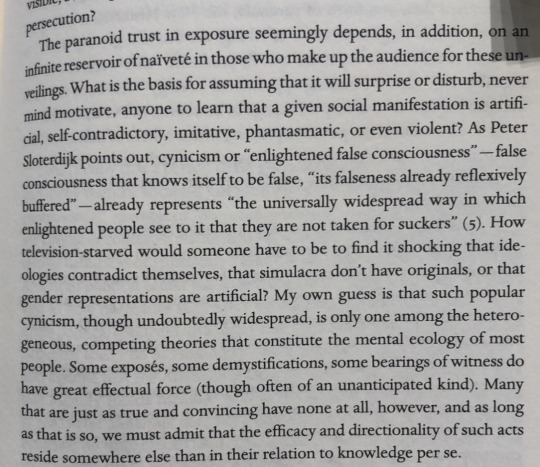
“The paranoid trust in exposure seemingly depends, in addition, on an infinite reservoir of naïveté in those who make up the audience for these unveilings. What is the basis for assuming that it will surprise or disturb, never mind motivate, anyone to learn that a given social manifestation is artificial, self-contradictory, imitative, phantasmatic, or even violent? As Peter Sloterdjik points out, cynicism or “enlightened false consciousness”—false consciousness that knows itself to be false, “it’s falseness already reflexively buffered” —already represents “the universally widespread way in which enlightened people see to it that they are not taken for suckers” (5). How television-starved would someone have to be to find it shocking that ideologies contradict themselves, that simulacra don’t have originals, or that gender representations are artificial? My own guess is that such popular cynicism, though undoubtedly widespread, is only one among the heterogeneous, competing theories that constitute the mental ecology of most people. Some exposés, some demystifications, some bearings of witness do have great effectual force (though often of an unanticipated kind). Many that are just as true and convincing have none at all, however, and as long as that is so, we must admit that the efficacy and directionality of such acts reside somewhere else than in their relation to knowledge per se.”
Eve Kosofsky Sedgwick, “Paranoid Reading, Reparative Reading,” Touching Feeling: Affect, Pedagogy, Performativity (2003)
6 notes
·
View notes
Text

there is another sky
ever serene and vibrant
there is another sunshine
ever intense and majestic
and there's another me
in my shadow
ever phantasmatic and ethereal
but all are in different part of the world
they seem as real as we are
but the darkness consumes
them all in the blink of an eye....🖤🌈
0 notes
Note
What does the name of Maggie "Phantasma" mean? Why did you gave her that name?
Oooohhh that's a good question!
Okay this is going to be a long post.
So first of all when I looked for an alias for her I wanted something that Maggie herself would give herself, which means something that would fit her abilities, personality, interests but also story. I didn't wanted to just give her the name Shadow or Phantom cause none of them were something I thought yes that's it. None of them really fit to the whole spectrum of her. I was also considering to name her Ghost or Echo but they were already taken and for I wanted a name that didn't existed yet in Marvel. Besides that with them I also kinda had the same problem like I had with Shadow and Phantom, it didn'tincluded everything. Then I googled for synonyms and found the words "Phantasma" and "Phatasmagoria.
So here we go: (Btw I kinda just translated the german wiki page of phantasma here cause there's no real english wiki page to it. For Phantasmagoria I took the infos from wikipedia and an article I found while looking this up I linked them down there too)
Phantasma is in short a product of fantasy as a delusive appearance, illusion, ghost, specter or a figment of the imagination in short: Something that is seen or imagined but is not real. The word comes from ancient Greek and means something like: appearance, image, idea/imagination, face or a sign sent by the deity, miracle, dream image with and without a dream, ghost, spirit and can be a also used as synonym for well phantom or ghost. It refers to a mental, inner imagination in the sense of a fantasy or mirage. In the German-speaking world, phantasma refers to a perception-like scenic condition, psychiatrically something like illusion, pseudohallucination and hallucination. The word is considered little used and antiquated. It has a negative function, such as forgetting and repressing things, but can also be viewed from the perspective of self-assertion and rebellion against unworthy circumstances. In French psychiatry, phantasma generally means something like a pictorial scene in which the person concerned realizes a wish or unconscious wish. In this respect it is the same as daydreaming. The term plays an important role in the context of Jacques Lacan's psychoanalysis, where it describes a certain form of imaginary fantasy. The term phantasma has a long tradition, particularly in philosophy, and was already used by Aristotle in the sense of a mental “image”. It roughly corresponds to what we understand today as fantasy or imagination. “Imagination” means the ability to produce mental images, while phantasma refers to the images themselves produced by the imagination. – In ancient times, techniques for better memorization were based on the principle of sensualization (mnemonics). Therefore, memory contents were viewed as memory images (ancient Greek phantasmata, Latin imagines). A form of phantasma is also hallucination, in which the phantasma is not recognized as a phantasma but is confused with an external sensory perception. Lacan uses phantasma to describe the psychological representation of an object or a situation that the subject remembers visually. The phantasma thus belongs to the register of the imaginary. Phantasma is therefore a form of defense. The development of a phantasma is often based on traumatic experiences, which are, however, warded off and reinterpreted in the image presented. Behind the individual phantasmatic image there is ultimately a “fundamental phantasma” on which the identity of the subject and the forms of his desire are based.
"Phantasmagoria" on the other hand is a form of horror theatre that (among other techniques) used one or more magic lanterns to project frightening images. During the show scenes and stories were performed with the use of magic lanterns and rear projections to create dancing shadows and frightening theatrical effects. These lively, interactive events incorporated storytelling, mythology, and theater in a single art form that entertained while providing a space for thinking about the otherworldly-playing with the viewers’ anxieties regarding death and the afterlife. In many shows, the use of spooky decoration, total darkness, (auto-)suggestive verbal presentation, and sound effects were also key elements. The shows started under the guise of actual séances in Germany in the late 18th century and gained popularity through most of Europe (including Britain) throughout the 19th century. The word "phantasmagoria" has also been commonly used to indicate changing successions or combinations of fantastic, bizarre, or imagined imagery.
When I read about all of this I instantly thought this is it! Cause it fits so many of her abilities, her story but also interests of philosophy, psychology and theater. It was also perfect that Phantasma is used as synonym for phantom/ghost/illusion cause in her story that's kinda how she's always described as a ghost an illusion or phantom a horror story but nothing that really exist etc. Another reason was in her story she couldn't remember her life before HADES or who she was for a very long time and she also had lots of traumatic experiences that made her to the person who she is today and kinda "created" her. She also rebelled against unworthy circumstances as she was the one who destroyed HADES and she also works like some sort of defense as she tries to protect everyone from what is left of HADES so no one has to suffer the same fate she had too and in the same moment she tries to repress her memories of HADES and what happened to her there.
So that's why I went with Phantasma, cause it conected so many aspects of her in one name.
#<<𓅪 𝐎𝐎𝐂 : 𝐌𝐔𝐍 𝘐𝘐 𝘢𝘷𝘺 𝘵𝘩𝘦 𝘷𝘰𝘪𝘥 : 𝘰𝘷𝘦𝘳 𝘢𝘯𝘥 𝘰𝘶𝘵 𓅪>>#<<𓅪 𝐎𝐎𝐂 : 𝐌𝐔𝐍 𝘐𝘐 𝘢𝘷𝘺 𝘨𝘰𝘵 𝘢𝘯 𝘢𝘴𝘬 𝘐&𝘐 𝘢𝘷𝘺 𝘢𝘯𝘴𝘸𝘦𝘳𝘴 𓅪>>#<<𓅪 𝐎𝐎𝐂 : 𝐌𝐔𝐍 𝘐𝘐 𝘢𝘷𝘺'𝘴 𝘩𝘦𝘢𝘥𝘤𝘢𝘯𝘰𝘯𝘴 𝘐&𝘐 𝘮𝘶𝘴𝘪𝘯𝘨 𓅪>>#<<𓅪 𝐎𝐎𝐂 : 𝐌𝐔𝐍 𝘐𝘐 𝘢𝘷𝘺'𝘴 𝘰𝘤𝘴 𓅪>>#𝐎𝐂 : 𝚖𝚊𝚐𝚐𝚒𝚎 𝚖𝚌𝙲𝚘𝚢#i probably adding this to maggie's page...
0 notes